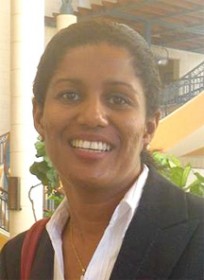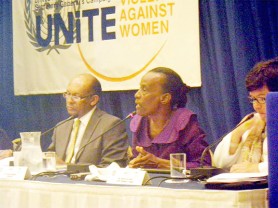– as Unite campaign launched
By Iana Seales in Barbados
The Caribbean launch of the United Nation’s Secretary General’s Campaign ‘Unite to End Violence Against Women’ kicked off yesterday in Barbados amid concerns about government involvement in ending the scourge and the lack of outrage against the high levels of violence against women in the region.

The focus of the campaign is on strengthening accountability and changing culture to end the crippling cycle of gender abuse across countries; it also seeks to build a consensus on law and social policy reform and implementation of goals.
The Caribbean’s sexual reform laws were scrutinized and in some instances, criticized for failing to provide women and children with the protection they need. Guyana’s sexual reform laws were singled out as a significant development in the region and “an indication as to where the Caribbean should be moving”, particularly the new procedures for police investigations and new rules as to how victims gave evidence.
Additionally, the move to eliminate preliminary inquiries was praised.
Dr Rosina Wiltshire, Caricom’s Advocate for Gender and Justice yesterday decried what she described as a culture of normalcy and impunity with respect to the issue of domestic violence and according to her, the legal system is also complicit. She pointed to statistics which indicate that only 1% of reported rapes in Guyana and 3% in Trinidad and Tobago result in conviction, adding that “a high percentage is not reported at all”.
Dr Wiltshire said that patriarchy combined with colonialism and slavery to entrench a culture of violence against women. This, she argued, lies at the root of the problem in the Caribbean.
She said the consequences of the culture of violence point to a high distrust of

the law and police in the region, noting that the violence is growing and becoming normal in schools and in the communities but “was always normal in the homes”. According to her, legislators must support a culture of peace and increase confidence in the law and consequently the police.
Barbados’s Minister of Labour, Esther Byer-Suckoo pointed to the legislative gaps in the region and the accountability of law makers saying that domestic violence must be an issue which can make and break political campaigns. Governments, she said, should be judged by how they treat the issues.
She said too that the fight must be taken beyond legislation and policy to NGOs and civil society and the society at large. She added that the community needs to be held accountable, “…the neighbour, the church, the school, employers and workmates”. She argued that people need to stop reducing it to a “man and woman issue” and that they also need to encourage their children to discuss it.
Byer-Suckoo noted that through public education government can strengthen accountability in communities and she called on young women in the region to learn more about domestic violence and their risks, noting that more information is now available on the characteristics of abusers and those who they target.
The Unite to End Violence Against Women campaign was officially launched two years ago; other initiatives were launched in Latin America and in Africa. Some objectives of the campaign include the adoption and enforcement of national legislation to address and punish all forms of violence against women and girls; the adoption and implementation of multi-sectoral national action plans; strengthening of data collection on the prevalence of violence against women and girls; increasing public awareness and social mobilization and systematically addressing sexual violence in conflict situations.





